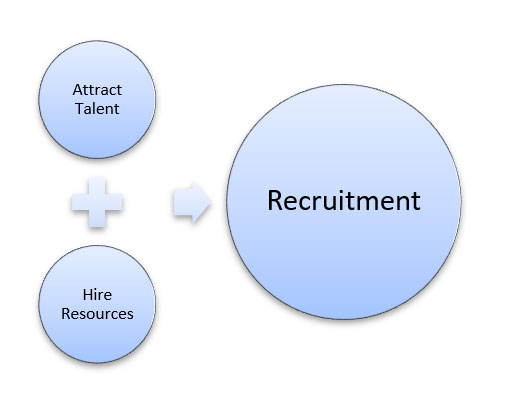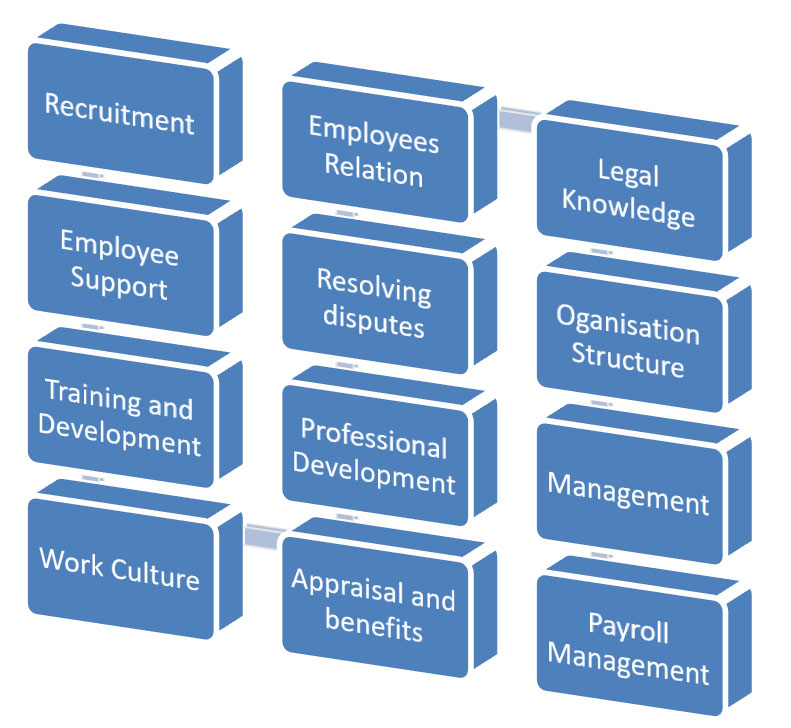Top 12 Duties, Responsibilities And Role of HR Manager
Top 12 Duties, Responsibilities And Role of HR Manager: The role of Human Resource Managers is continuously evolving as various strategies are required in the array of products, services, traditions and ideas in a quest to incorporate the strategies and plans. In the past times, these managers are only responsible to manage the basic data work as well as regular details of workers but now their role widened and they are confined to solve the complex nature of work, legal obligations, and strategic management of the company’s objective.
Also See: Functions of Human Resource Management
Top 12 Duties, Responsibilities, And Role of HR Manager
Here, we are going to discuss the role of HR Managers in the development of the accomplishment of the goals of an organization. Let’s begin with highlight one i.e. Recruitment.
1. Recruitment:
It is the main role that is in close association with HR and it is a major responsibility for a team of HR professionals. They need to devise policies, guidelines and plan strategies for hiring a suitable candidate who can contribute towards the goal of the organization. Before the recruitment of a candidate, HR Manager acts as a mediator between the employee and the candidates to introduce all the terms and conditions of the company to the candidate. This one is the first stage and the vital one to pick up the right candidate for the company by a proper understanding of the vacant position. It is the main pillar of the professional career of an HR Manager and it comprises of two main aims which are given below:

a). Attract Talent: the requirement of manpower in a company starts with planning and attracting talent. First of all, they determine the need of the company’s human resources and make a plan accordingly to meet all the requirements by recruiting talented professionals having relevant skills and abilities. Further, the “Employer brand” is created which indicates the professional image and portrays an impressive appearance of the company in the mind of the potential candidates.=
In this new era of media and awareness regarding employee rights, it was becoming important to consider all the aspects of employer branding. It is not enough to put the best foot forward as it is needed to take some honest actions in favour of the employees. Detailed strategies for recruitment must be created by the HR Manager to successfully run the process of hiring.
Also See: Evolution and History of Human Resource Management
b). Hire Resources: Now, it is time to put the hiring process into action. Vying of competition is running in the market to get the attention of talented candidates. The HR Manager has to take some stringent strategies and planning to take out there in the marketplace and figure out the best gem for the growth of the organization. The role of HR Manager includes some activities such as interact with a maximum number of potential candidates with the use of mass media, collect their responses, take off irrelevant applications, figure out the right candidates and corporate with them through interviews internally. Once the candidate gets finalized, then the HR Manager acts as a mediator between the organization and the candidate to find out a win-win negotiation.
2. Employee Support:
They give solutions to the conflicts and issues of the employees and take care of them. Moreover, they get suggestions and feedback from the employees regarding the facilities of the organization and include uncomfortable facilities that can hinder the working of other employees. HR Manager is a person who can all the issues in front of the management and solves the same.
3. Training and Employee Development Programs:
The role of HR Manager is not yet completed until the candidate selection has done. All the tasks are performed quite in a different manner and here, the training part plays a vital role as the new hires need to understand the work pattern of a company and acquired the same. It is vital for the HR team to incorporate a training program for every new candidate on the basis of the skill set required for the job. Moreover, it will also come up with the retention and motivation of the employee.
On-the-job training is needed for the initial days for every new employee hired to coincide with the working guidelines of the organization. In this way, proper training is given to the employee and it will also provide an insight into the workmanship of the recruited employee for the HR Team. Further, the HR team will assess the performance of the employee and grade them accordingly.
Also See: Skills of Human Resource Manager
4. Professional development:
It is a bonus point for the organization as well as employees to grow as a professional. It is in the personal interest of the employee to be a part of various seminars, meetings, trade shows, conferences, etc. and it maximizes engagement also. This will give a skill set that adds value to the personality of the employee. Moreover, it is the major responsibility of the HR Manager to know about the hobbies, area of interest of the employees and help them to engage in relevant activities that can increase their knowledge and skills.
5. Appraisal and benefits:
The entire team of HRM is meant for the employees of the organization and carrying out the regular check on the performance appraisals. It assists the employees to give their potential through the encouragement and get feedback on their work as well as equip with some suggestions required for the same. This provides a clear vision to the employees that what the expectations of an organization are. In this way, they can get the idea of making improvements in the performance and also how to achieve the targets.
The role of the HR Manager is to generate reports on a timely basis and get reviews on the same on behalf of the authorities. Now, the HR Manager will interact with each employee separately and given them suggestions as well as feedback on their performance. This procedure will help to gather the high level of productivity and engagement of the employee.

6. Maintenance of Work Culture:
It is the duty of an HR Manager to maintain a healthy, secure and fun environment to make sure the comfort factor of employees at the workplace. It also decreases any awkward atmosphere that has a bad impact on staff performance.
An open-door policy ought to be there as the employees have the right to speak and voice their perspectives so that workers can communicate freely. It is just that the HR Manager treats every employee equally and establish a rapport among the employees. So, they need to ensure that the employees get a great level of satisfaction.
Also See: Importance of HRM(Human Resource Management)
7. Resolving Disputes:
It is evitable that conflicts must be there as every person has a different point of view. An HR Manager is responsible to map out solutions for the disputes between the employees or between the employees and the management. Making judgmental decisions must be there without any partiality and HR Manager needs to look over all the aspects of the conflicts, so the decision must be fair at the end. There is no expectation from the side of the HR Manager to play a card of favoritism and deliver a practical decision. Moreover, any reimbursement, in any case, leads to taking some stringent actions against the defaulter.
8. Employee Relations:
Human resources is important as it is meant to deal with the human part of an organization that needs a level of interpersonal skills. It does not serve the purpose of a good HR Manager if the person is a couch potato and fail to build some healthy relations with the employees. An HR team must build up a good public Image within the organization and feel comfortable with all the problems.
At the same token, the job of HR personnel is not a desk job and has to be proactive as well as know their employees very clearly.
9. Legal Knowledge:
It is a vital aspect of HR personnel but the least glamorous one. An HR Manager should be aware of the rules and regulations. It is the duty of the HR department to keep all the guidelines in kind while devising new policies as well as writing the terms and conditions of any contract. The HR Manager ensures that all the practices and rules of an organization ought to be in tune with the labor laws, taxation laws, working hours, wages rule and no-discrimination policies.
Also See: Human Resource Management Process
10. Organization Structure and Planning:
All the functions of the organization are planned by the team of HR. To begin with, it comprises of welcoming all the new employees, carry out the induction of employees and provide them orientation related to the policies of the company and regulations. The introduction of new candidates with the incumbents and assign them a manager or a mentor who can guide them perfectly in their field of work.
11. Management:
As the designation indicates, the important role of an HR Manager is Management. The term management involves managing the employees, employers as well as entire departments too. Manage, create, apply and monitor policies and regulations for every employee and its functioning is lead to management.
A major chunk of an HR department is to supervise attendance as well as maintain a track record of leave forms. IN addition to this, there must be proper management of in and out timing as well as late arrivals by the department of HR as well as overtimes and half-day leaves. A fair HR Manager can only handle the HR department in an effective and efficient way.
Also See: Trade Union in HRM, Objectives, Types, Functions and Role
12. Payroll Management:
On the basis of tracking leaves, clocks in or outs are tracked, it is time to calculate the payrolls of all the employees. The role of HR Manager is the management of payroll and the calculations of the salaries, wage cuts, reimbursement and pay generation with slips.
To set the ball rolling, the roles and responsibilities of an HR Manager are to keep an eye over the recruitment process, designing the policies of the company and setting up goals for the HR team. To succeed in this role, the HR Manager ought to be familiar with the technologies, payroll systems as well as Applicant Tracking Systems. It is significant to be a professional and well-mannered HR Manager to contribute to the goal achievements of the company.
Also See: Challenges of Human Resource Management
So it was all about Role and Duties of HR managers, if you have any questions then please comment below.
Leave a Reply